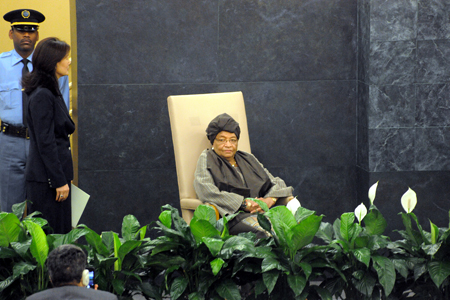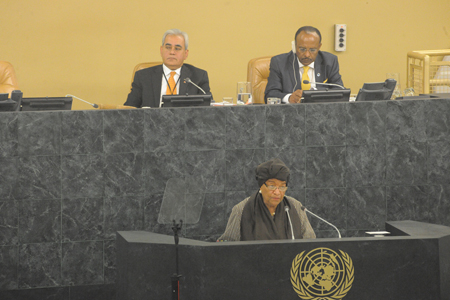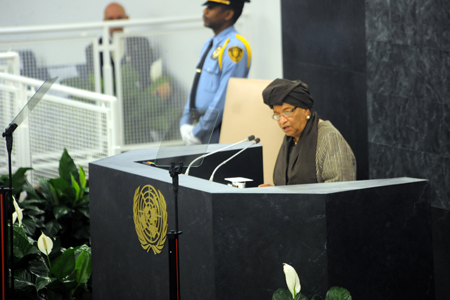
(UNITED NATIONS HEADQUARTERS, NEW YORK – Tuesday, September 24, 2013) President Ellen Johnson Sirleaf is calling on the United Nations General Assembly to reflect on the emerging challenges of the world, boldly seize new opportunities, and commit to a new global partnership that promotes economic and social transformations for an inclusive and shared prosperity for all.
“Today, more than at any other time, we have an opportunity to transform our world; to pursue and agenda that will eradicate poverty while at the same time sustaining nature to secure natural resources for future generations,” President Sirleaf stressed, adding that the solutions of yesterday may not apply to today’s challenges, so everyone must muster the courage to take bold steps.
According to a dispatch from New York, President Sirleaf was addressing the 68th Session of the United Nations General Assembly on Tuesday at United Nations Headquarters. President Sirleaf was one of the few African leaders privileged to address the Assembly on the opening day of the general debate. The other African leaders that addressed the Assembly on Tuesday, September 24, included: President Goodluck Jonathan of Nigeria; President Armando Guebuza of Mozambique; President. Jacob Zuma of South Africa; and President Joyce Banda of Malawi.
The Liberian leader expressed her thanks and appreciation to UN Secretary-General Ban Ki-moon for her selection as one of three Co-Chairs of a 27-member High-Level Panel of Eminent Persons tasked to make recommendations for a new global development agenda post-2015. She informed the Assembly that the Panel had submitted its Report in May. President Sirleaf, who now chairs the African Union’s High-Level Committee of ten Heads of State, informed the Assembly that Africa is working towards a continental consensus which will convey an African Common Position on the Post-2015 Development Agenda. “We agreed upon a roadmap that will ensure a global development framework that is not only brave and ambitious, but one that reflects African priorities, a global agenda that creates an enabling environment for Africa’s transformation which includes infrastructure development, increased productive capacities, resilience to external shocks and enhanced statistical capacities that will accelerate the creation of employment that is directed particularly to our youthful populations,” the Liberian leader said.
Commenting on other activities, President Sirleaf, who also chairs the High-Level Panel on Fragile States, under the aegis of the African Development Bank (AfDB), informed the Assembly that of the 7 billion people in the world, 1.5 billion live in situations of conflict and fragility. “This data puts fragile states in the center of the new post-2015 agenda,” she pointed out, stressing that they hold the view that the peculiarities and special circumstances of post-conflict nations should be accommodated by international partners.
She stressed that the achievement of sustained economic growth and development in these countries is critical in reducing their vulnerability to new political and economic shocks, fueled in many cases by high expectation gaps that need to be mitigated. “We therefore call on all our partners to renew their support to the New Deal on Fragile States, which calls for stronger Ownership, Harmonization, Results and Mutual Accountability,” President Sirleaf said.
Speaking on developments at home, President Sirleaf brought greetings from the Government and people of Liberia who this year celebrated ten consecutive years of peace and progress. She informed the Assembly that over the ten years, Liberia’s pride had been restored, and the country has returned to the comity of nations as “a respectable and responsible partner.”
“With the support of the international community, especially the United Nations through its peacekeeping and peace-building efforts, we have rebuilt a new, ethnically balanced, professional army, increased the size and enhanced the professionalism of our police, immigration, and intelligence forces in line with our commitment to bear full responsibility for security within our border as UN peacekeepers execute a phased drawdown,” President Sirleaf pointed out.
She commended the UN Security Council for extending the mandate of the UN Peacekeeping Mission in Liberia (UNMIL) to September 30, 2014; and committed to meeting all the expectations of Resolution 2116, including continuing to take concrete steps aimed at developing and sustaining a self-sufficient and competent security sector, able to tackle violent crimes, sexual and gender-based violence and infringement of the rights of the ordinary person.
President Sirleaf indicated that Liberia has come a long way, but warned that the country still has an even longer way to go, in reducing our huge infrastructure deficits in power and in transport; in consolidating the culture of integrity and accountability in a society that is still beset by values occasioned by years of conflict; in promoting natural reconciliation and healing; in expanding growth and diversifying the economy, making it more resilient to internal and external shocks, and more responsive to the ever-increasing demand of our people for jobs and improved livelihoods. She added, “We still have much to do in continuing the reforms that will ensure equitable benefit from natural resource capital to current and future generations.”
On regional issues, President Sirleaf expressed pride about Africa’s tremendous progress, recounting that the continent’s growth is averaged at 5 percent annually, economies are diversifying, trade infrastructure expanding, democracies becoming strong and maturing and regional institutions strengthening and leading the processes of cooperation and integration. The new Africa, she noted, is not just about growth as there is improvement in school enrollment, health indicators, in trade and investment. “The share of people living in poverty is declining, democracy, while needing room for improvement has become the norm rather than the expectation and governance has improved significantly over the last decade,” she said.
She praised the efforts and strong collaboration among regional economic communities, the African Union, the United Nations and the international community that responded robustly in the Malian crisis, thereby averting the threat posed to the peace and security in the sub-region.
President Sirleaf expressed deep concern about the growing number of senseless violence around the world, as exemplified by the murder of innocent persons in a terrorist attack on a shopping mall in Kenya. She expressed condolences to the President, Government and people of Kenya on such terrible loss.
On the global front, the Liberian leader lamented the ongoing civil war in Syria; condemned the use of chemical weapons in Syria and anywhere else in the world and called for concerted and renewed international efforts to stem the rising scourge of terrorism and other transnational crimes by action to control and eliminate weapons of mass destruction.
In closing, President Sirleaf expressed gratitude to the UN family for sustaining the country’s agenda of peace-building and sustainable development. “Since its founding, the United Nations has had its share of challenges; but it remains the beacon of hope for the peoples of the world who thirst for peace; a world that is fair, a world that is prosperous, a world in which the uncommon dreams of all will have a fair chance of realization; a world where the weak can become strong; a world where no nation feels developed and powerful until all nations have their share of the global wealth,” she pointed out, stressing that the leaders of today must rise up to these challenges as the future begins today. “We must commit to a new global development trajectory that gives all of humanity a world of peace, dignity and prosperity.”
Before, addressing the Assembly’s sixth plenary meeting, President Sirleaf attended a welcoming ceremony hosted by Secretary-General Ban in the East Delegates’ Lounge at UN Headquarters. Following her late afternoon address, the President participated in a panel discussion on “Domestic Resource Mobilization with the Future Global Partnership for Development,” hosted by the Minister of Finance of Nigeria, Dr. Ngozi Okonjo-Iweala. She later attended a reception hosted by South Africa’s President, Jacob Zuma, and met with former United States Ambassador to Liberia, now Assistant Secretary of State, Linda Thomas-Greenfield.
On Wednesday, September 26, President Sirleaf will attend a Special Event on the Millennium Development Goals, organized by the Trusteeship Council, as well as a meeting on Building Consensus on the Post-2015 Development Agenda in Africa, sponsored by Nigeria’s President Goodluck Jonathan. In the evening, she will attend the 10th anniversary reception of the Center for Universal Education of the Brookings Institution. Click here to read full text of address. ====> Mouse over the photo s to show context.



